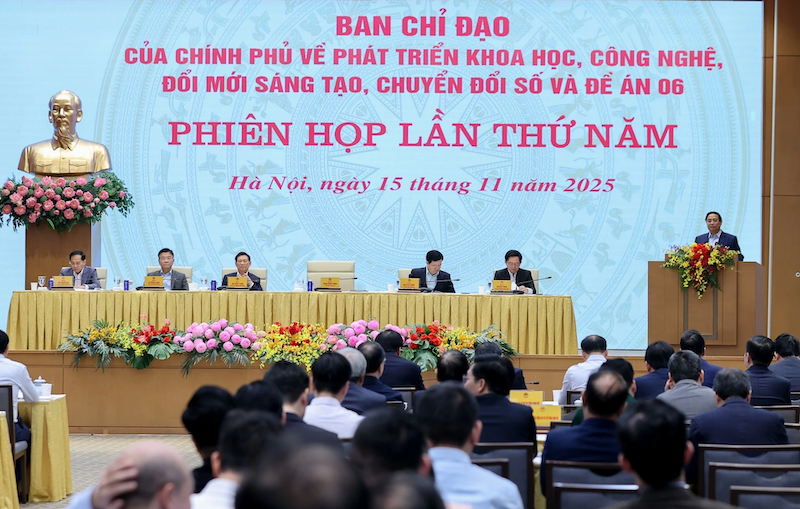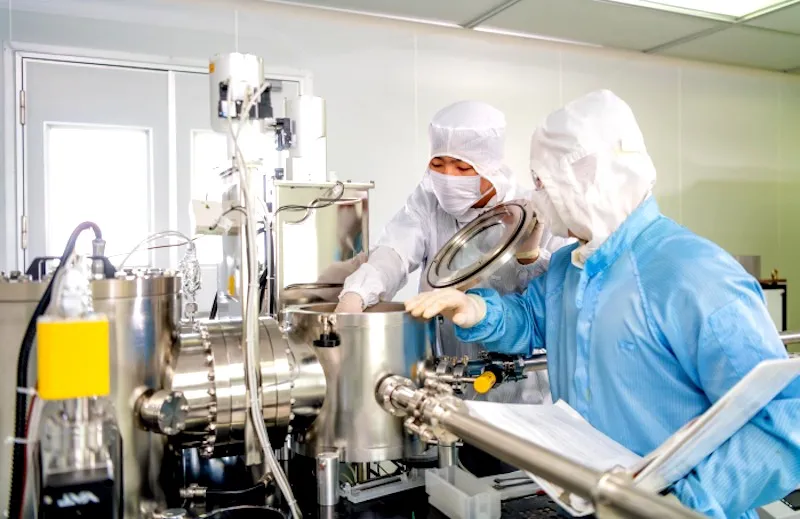Vietnam sets massive 2026 budget to drive science, innovation and digital transformation
Vietnam plans a major investment push in 2026, allocating VND95 trillion (US$3.6 billion) to science and technology, innovation and digital transformation as the Government aims to turn these fields into core drivers of economic growth and competitiveness.
The Vietnamese government plans to allocate around VND95 trillion (US$3.6 billion) in 2026 for the development of science and technology, innovation and digital transformation, Prime Minister Pham Minh Chinh said on November 15.
The budget for these fields in 2025 was set at VND25 trillion (nearly US$950 million), he said at the fifth meeting of the Government’s Steering Committee on science and technology, innovation, digital transformation and Project 06.

An overview of the committee’s fifth meeting of the Government’s Steering Committee on science and technology, innovation, digital transformation and Project 06 on November 15. Photo: VGP
Prime Minister Chinh, who also heads the steering committee, said the Government has submitted to the National Assembly a resolution on the allocation of the 2026 central budget, which includes funding for science and technology.
Minister of Science and Technology Nguyen Manh Hung said at an October meeting that the State plans to spend US$3–4 billion annually, helping mobilize total societal investment of US$10–15 billion so that science and technology, innovation and digital transformation can contribute at least 5% to national GDP growth.
Of this contribution, science and technology should make up 1%, innovation 2%–3% and digital transformation 1%–2%.
He said this “trinity” of science and technology, innovation and digital transformation drives development, accelerates growth and increases productivity, quality and national competitiveness.
To implement the Politburo’s Resolution 57 on harnessing national digital transformation, science, technology and innovation, several new laws in the science and technology sector have been or will be issued this year, Hung said.
The goal is for science and technology, innovation and digital transformation to contribute no less than 5% to GDP growth, the minister added.
At the meeting, the prime minister assigned the State Bank of Vietnam and commercial banks to deploy the VND500 trillion (US$19 billion) credit package for strategic infrastructure and digital technology with specific conditions and criteria.
To secure funding, the ministries of Finance and Science and Technology will propose suitable financial mechanisms and guarantee sufficient capital allocation.
Priority areas include the national data center, data trading platforms, national key laboratories, research centers, strategic technology development projects and essential databases.
The Ministry of Science and Technology will soon submit a plan to support Vietnamese digital technology enterprises in expanding globally, as well as a plan to strengthen public R&D institutions.
In addition to urging telecom operators to provide nationwide 5G coverage, the ministry will address issues related to the Starlink project to enable rollout by 2026, targeting 500,000 subscribers.
The Ministry of Justice will conduct a full review of current online public services and the progress of database development and management.
The Ministry of Public Security will develop VNeID tools to support the upcoming elections for the National Assembly and People’s Councils at all levels, accelerate the launch of National Data Center No. 1 and study the development of a second center.
The Ministry of Construction and localities will prepare smart-city proposals for the six centrally governed cities – Hanoi, Haiphong, Hue, Danang, Ho Chi Minh City and Cantho – and design smart border-gate models to combat smuggling and trade fraud.
The prime minister assigned the Ministry of Education and Training to build lifelong learning records connected to the national database of degrees and certificates and to digitize all diplomas and certificates by Q1 2026.
A nationwide electronic health record system will also be developed with full interoperability across hospitals.

Scientific research at the laboratory of the Nano and Energy Center at the University of Science, Hanoi. Photo courtesy of the university
Reports presented at the meeting showed that science and technology, innovation and digital transformation continued to expand strongly and achieved major results in January-October of 2025, creating new momentum for socio-economic development.
The prime minister approved 11 groups of strategic technologies and 35 groups of strategic technology products, including six products scheduled for deployment in 2025.
The national innovation portal and the national science and technology exchange platform have been launched. Vietnam maintained its ranking of 44th out of 139 countries in the Global Innovation Index 2025.
Vietnam ranked 13th worldwide in Internet speed, while 5G coverage reached 39.5% of the population. The country completed a 3,900-km terrestrial fiber-optic cable system linking Vietnam and Singapore.
Several AI data center projects were underway, including those by VinAI, FPT, Viettel, VNPT and CMC. Vietnam is also studying the development of a Super Data Center in Ho Chi Minh City.
In the 10-month period, revenue in the digital technology (ICT) industry icreased by 52% on-year to over VND4 quadrillion ($151.8 billion). Digital product exports gained 27% on-year to $142 billion.
More than 315,000 enterprises and household businesses used e-invoices generated from cash registers, with 3.58 billion e-invoices issued. Tax revenue from e-commerce reached VND152 trillion ($5.7 billion), up 64% year-on-year.
Through the citizenship app VNeID, authorities disbursed VND32.9 trillion ($1.2 billion) to policy beneficiaries and raised VND177 billion ($6.7 million) in donations and relief for people affected by storms and floods.








